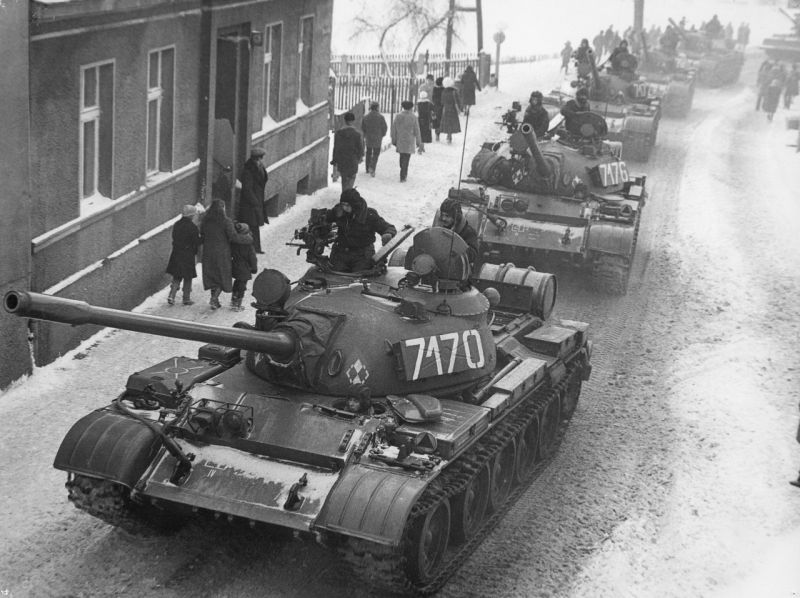13 December marks the anniversary of introduction of Martial Law in Poland. An authoritarian government, led by General Wojciech Jaruzelski and the Military Council of National Salvation (WRON), introduced severe political oppression in an attempt to crush political opposition.
In 1980-1981 the Communist Party of Poland suffered from a substantial crisis. It could not cope with the expansion and pressure of ‘Solidarity’ movement, its growing popularity and demands to extract reforms from the government. The Party itself was divided by factional struggles and confusion in the leadership. Poland’s economy had practically collapsed. On the other hand, there was pressure of dissatisfied Kremlin and its threats of supposed armed intervention. Plans for reconsolidation of power were prepared in secret. General Jaruzelski - Prime Minister and the First Secretary of The Party - believed that without Martial Law, the military intervention was inevitable. His decision was an act of self-defence, necessary to keep the hold on the country.
On Sunday morning, 13 December 1981, millions of Poles awoke to find that the entire country was placed under a state of martial law. Appearing on television, in the only available channel, Jaruzelski said:
Today I address myself to you as a soldier and as the head of the Polish government. I address you concerning extraordinarily important questions. Our homeland is at the edge of an abyss. The achievements of many generations and the Polish home that has been built up from the dust are about to turn into ruins. State structures are ceasing to function. Each day delivers new blows to the waning economy.
Jaruzelski declared that his intention was to maintain “legal balance of the country, to create guarantees that give a chance to restore order and discipline” and “save the country from collapse”. For the Poles however, it meant putting an end to the hopes for political and civic freedoms. Thus started severe repressions – many people were arrested and imprisoned. Those who were not – were intimidated, forced to stop their activity or emigrate. For those who were already abroad, closed borders meant that coming back to the country was not possible at all. Multiple organisations and pro-democratic movements, including ‘Solidarity’, became illegal overnight. Moreover, the streets were filled with tanks and armed soldiers. Telephone lines were controlled, airports closed and mail regulated by censorship. Another restriction of freedom was an imposition of curfew. Similarly, the mass media, public transportation and educational institutions were placed under strict control. It was clear that the new regime wanted to mercilessly crack down on the opposition.
Introduction of Martial Law was a general strike for “Solidarity”. The trade union was made illegal and most of its leaders were interned. Those who avoided arrest started to reconstruct ‘Solidarity’ in the underground. The amount of social opposition was impressive. During the initial impositions of martial law, several dozen people were killed. The shipyards in Gdańsk and Szczecin were pacified, as well as the Lenin Iron Mill in Nowa Huta and Iron Mill in Katowice. In Katowice, on 16 December, happened the most dreadful incident, when six miners from the Wujek coal-mine were killed by members of the military police ZOMO.
< p>Foreign reactions to events in Poland were immediate. Soon after the announcement of General Jaruzelski, the news reached all corners of the World. If the Soviets reacted with a sigh of relief, the response of the Western governments was generally negative. The politics of the communist regime was particularly condemned by the United States and its President, Ronald Reagan. On 23 December, he made a special announcement addressed to the nation “about Christmas and the situation in Poland”. Reagan promised to continue shipments of food to Poland, but also imposed economic sanctions against the government of Jaruzelski, followed by the sanctions against the Soviet Union.Martial Law lasted till July 1983 being officially suspended on 18 December 1982. All that time was a trauma for the Poles and democratic opposition. The situation of already run-down Poland drastically deteriorated and the country was pushed toward bankruptcy. The prospects for the future were dark, but it was only a matter of time before the ultimate fall of communist regime.
By Katarzyna Ścierańska
Bibliography:
A. Dudek, Z. Zblewski, Utopia nad Wisłą. Historia Peerelu, Warszawa 2008.
Poland's Transformation: A Work in Progress : Studies in Honor of Kenneth W. Thompson, ed. M. J. Chodakiewicz, J. Radzilowski, D. Tolczyk, Charlottesville 2003.
